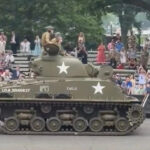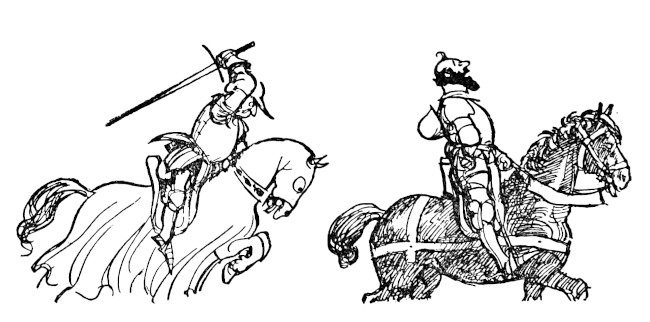Note: If you wish to receive, via e-mail, (1) my weekly newsletter or (2) daily copies of these posts, write to me at rrbates1951@gmail.com. Comments may also be sent to this address. I promise not to share your e-mail with anyone. To unsubscribe, write here as well.
Monday
As somewhere between four and six million Americans gathered around the country to protest Donald Trump’s attempted fascist takeover—despite threats of rain we drew 200+ to a rally in ruby red Winchester TN—the president got the military parade he’s been salivating over ever since his first term. Everyone knew that parade was for himself, not for the army’s 250th birthday or for Flag Day, and a hot mic moment made this clear. Asked off stage whether he would be inviting North Korea’s Kim Jong Un to the White House, Trump responded admiringly, “He speaks and his people sit up in attention. I want my people to do the same.”
There were relatively few sitting up and paying attention upon this occasion. As the New York Times’ Shawn McCreesh reported at one point,
The energy level at the military parade here is a bit desultory. The crowds are calm and light, a bit sapped after waiting in the oppressive D.C. humidity for hours to make it to this point, and it’s now spitting rain. The announcer stopped with the neat history lesson just now and an instrumental version of Heart’s “Barracuda” is being blasted over the loudspeakers.
A tiny but revealing detail brings me to today’s poem. At one point a commentator who goes by the name “Tennessee Holler” observed on Bluesky, “Our military deserves better than this empty charade. Yikes. The tank squeaking over silence is incredible.” Another advised us to “watch the clip of that tank squeaking slowly and painfully along in silence, past empty stands, like a cartoon of abject sadness.” All of which put me in mind of the A.A. Milne poem, “The Knight Whose Armor Didn’t Squeak.”

I haven’t read the poem since my kids were young. When I revisited it, I saw a knight so averse to fighting and so puffed up with his view of himself (he thinks he’s smart because he can subtract 9 from 20) that he is affronted whenever anyone challenges him. Like our president, he finds ways to slither out of confrontation, not to mention actual fighting. As the poem informs us, Sir Thomas Tom
felt that it was hardly fair
To risk, by frequent injuries,
A brain as delicate as his.
When he does respond to challenges from other knights, he always makes sure to be ensconced safely in his moated castle:
His castle (Castle Tom) was set
Conveniently on a hill;
And daily, when it wasn’t wet,
He paced the battlements until
Some smaller Knight who couldn’t swim
Should reach the moat and challenge him.
Call him TACO, as in Thomas-Tom Always Chickens Out.
To his credit, Trump braved the rain for the event Saturday, unlike the time in 2018 when he passed up visiting the graves of Americans who died in France during World War I for fear it would mess with his hair.
What most elevates Sir Thomas Tom in his own eyes is military spectacle. Just as Trump doesn’t want to be around military personnel who are fat or have disabilities, so Sir Thomas Tom wants armor that doesn’t squeak:
No other Knight in all the land
Could do the things which he could do.
Not only did he understand
The way to polish swords, but knew
What remedy a Knight should seek
Whose armor had begun to squeak.
The only time that Sir Thomas Tom ventures into combat is when he encounters another knight whose armor doesn’t squeak—which is to say, who has the same vanities as he has—and he thinks he has won a battle when he humiliates his foe. Yet even here his attack is underhanded and from behind. Who knows whether he would have engaged with the unfortunate Sir Hugh in full frontal assault.
In short, reading Milne’s poem as a parable of Saturday’s march, we can say that it’s about a man with no substance who loves military show. All hat and no cattle, as they say in Texas.
The Knight Whose Armor Didn’t Squeak
By A.A. Milne
Of all the Knights in Appledore
The wisest was Sir Thomas Tom.
He multiplied as far as four,
And knew what nine was taken from
To make eleven. He could write
A letter to another Knight.
No other Knight in all the land
Could do the things which he could do.
Not only did he understand
The way to polish swords, but knew
What remedy a Knight should seek
Whose armor had begun to squeak.
And, if he didn’t fight too much,
It wasn’t that he didn’t care
For blips and buffetings and such,
But felt that it was hardly fair
To risk, by frequent injuries,
A brain as delicate as his.
His castle (Castle Tom) was set
Conveniently on a hill;
And daily, when it wasn’t wet,
He paced the battlements until
Some smaller Knight who couldn’t swim
Should reach the moat and challenge him.
Or sometimes, feeling full of fight,
He hurried out to scour the plain,
And, seeing some approaching Knight,
He either hurried home again,
Or hid; and, when the foe was past,
Blew a triumphant trumpet-blast.
One day when good Sir Thomas Tom
Was resting in a handy ditch,
The noises he was hiding from,
Though very much the noises which
He’d always hidden from before,
Seemed somehow less….Or was it more?
The trotting horse, the trumpet’s blast,
The whistling sword, the armor’s squeak,
These, and especially the last,
Had clattered by him all the week.
Was this the same, or was it not?
Something was different. But what?
Sir Thomas raised a cautious ear
And listened as Sir Hugh went by,
And suddenly he seemed to hear
(Or not to hear) the reason why
This stranger made a nicer sound
Than other Knights who lived around.
Sir Thomas watched the way he went –
His rage was such he couldn’t speak,
For years they’d called him down in Kent
The Knight Whose Armour Didn’t Squeak!
Yet here and now he looked upon
Another Knight whose squeak had gone.
He rushed to where his horse was tied;
He spurred it to a rapid trot.
The only fear he felt inside
About his enemy was not
“How sharp his sword?” “How stout his heart?”
But “Has he got too long a start?”
Sir Hugh was singing, hand on hip,
When something sudden came along,
And caught him a terrific blip
Right in the middle of his song.
“A thunderstorm!” he thought. “Of course!”
And toppled gently off his horse.
Then said the good Sir Thomas Tom,
Dismounting with a friendly air,
“Allow me to extract you from
The heavy armor that you wear.
At times like these the bravest Knight
May find his armor much too tight.”
A hundred yards or so beyond
The scene of brave Sir Hugh’s defeat
Sir Thomas found a useful pond,
And, careful not to wet his feet,
He brought the armor to the brink,
And flung it in…and watched it sink.
So ever after, more and more,
The men of Kent would proudly speak
Of Thomas Tom of Appledore,
“The Knight Whose Armor Didn’t Squeak.”
Whilst Hugh, the Knight who gave him best,
Squeaks just as badly as the rest.
I know there are some who proudly speak of Donald Trump. Their claims on his behalf, however, generally wander into fantasy land.
Further thought: Upon reflection, I’m thinking that Milne’s poem may have been inspired by the Duke of Plaza-Toro in Gilbert and Sullivan’s The Gondoliers. Think of Trump as you read the description:
When, to evade Destruction’s hand,
To hide they all proceeded,
No soldier in that gallant band
Hid half as well as he did.
He lay concealed throughout the war,
And so preserved his gore, O!
That unaffected,
Undetected,
Well connected
Warrior,
The Duke of Plaza-Toro!
I think of how, following the 2018 mass shooting at Marjory Stoneman High School that claimed 17 lives, Trump stated, “I really believe I’d run in there even if I didn’t have a weapon.” (This after calling the officer on duty “disgusting” for not having done so.) And then how he hid out in a bunker under the White House when demonstrators in nearby Lafayette Park protested the George Floyd murder.


